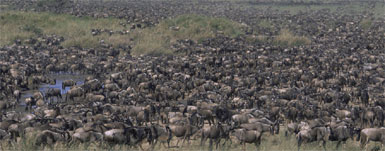As important as it is for the world to get off fossil fuels and switch to clean forms of energy to address climate change, protecting ecosystems is equally, if not more crucial.
We must allow ecosystems to store carbon as they have done for millenia, and that means maintaining healthy populations of top predators, which modulate the entire food chain.
Whether it’s wolves on land or sharks in the sea, the outcome is the same. Remove these predators and the herbivores take over, releasing stored carbon – whether in soils or the ocean.
On the other hand, Africa’s Serengeti ecosystem is so effective that it offsets all of East Africa’s fossil fuel emissions. Thanks, in part, to bears and wolves, the vast Boreal Forest offsets all of Canada’s emissions.
Annual wildebeest migration:

In "How Natural Geoengineering Can Help Slow Global Warming," Yale360 explains:
As natural wonders go, perhaps the most awe-inspiring is the annual migration of 1.2 million wildebeest flowing across East Africa’s vast Serengeti grassland. It would be a tragedy to lose these animals. But we almost did in the mid-20th century when, decimated by disease and poaching, their numbers crashed to 300,000.
The consequences of that collapse were profound. Much of the Serengeti ecosystem remained ungrazed. The accumulating dead and dried grass in turn became fuel for massive wildfires, which annually burned up to 80% of the area, making the Serengeti an important regional source of carbon dioxide emissions.
Then, conservation programs to eradicate disease and crack down on poaching led to recovery of the wildebeest, restoring the grazing system and reversing the extent of large-scale wildfires. Grazing now causes much of the carbon in grass to be released as animal dung, which is in turn incorporated by insects into soil reservoirs that are not prone to burning. The Serengeti ecosystem has now reverted to a carbon dioxide sink so large that it is estimated to offset all of East Africa’s current annual fossil fuel carbon emissions.
The wildebeest decline and recovery shows how the loss of just one species has far-reaching ramifications for ecosystems and the climate, Yale360 says, because of its impact on the food chain.
The same is true in coastal ecosystems, where marshes and mangroves can store carbon up to 40 times faster than tropical forests. Over-fishing predators has resulted in huge areas of marsh dying off, releasing carbon as sediments are exposed and preventing it from being absorbed.
We need to view enhancing biodiversity as one of the best tools we have to solving the climate crisis.
Read our article, Half From Renewables, Half From Forest Protection, That’s How To Address Climate Change.
Read the full Yale360 article:
